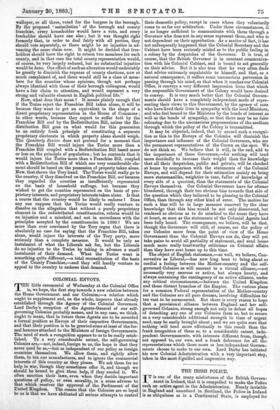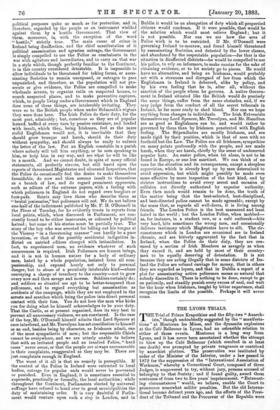THE IRISH POLICE.
TT is one of the many misfortunes of the British Govern- ment in Ireland, that it is compelled to make the Police such an active agent in the Administration. Nearly invisible in England and unnoticed in Scotland, the Police in Ireland is as ubiquitous as in a Continental State, is employed for
political purposes quite as much as for protection, and is, therefore, regarded by the people as an instrument wielded against them by a hostile Government. That view of them, moreover, is, with the exception of the word " hostile," strictly true. The main cause of crime in Ireland being disaffection, and the chief manifestation of it political assassination and agrarian outrage, the Government is simply compelled to use the Police as combatants in the war with agitators and incendiaries, and to carry on that war in a style which, though perfectly familiar to the Continent, is in this country considered detestable. It is impossible to allow individuals to be threatened for taking farms, or assas- sinating Societies to remain unexposed, or outrages to pass unpunished, and therefore, as the population will not pro- secute or give evidence, the Police are compelled to make wholesale arrests, to organise raids on suspected houses, to search suspected places, and to make preventive captures, which, to people living under a Government which in England does none of these things, are intolerably irritating. They were so to the British people when under Sidmouth's regime they were done here. The Irish Police do their duty, for the most part, admirably ; but, conscious as they are of popular hatred, baffled at every turn by passive resistance, and loaded with insult, which they, being Irishmen, feel as the more stolid Englishmen would not, it is inevitable that they should grow brusque and harsh, should do their duty without sympathy, and should always be ready to enforce the letter of the law. Put an English constable in a parish where nobody will tell him anything, or be seen speaking to him, or help him in any way, and see what he will be like in a month. And we cannot doubt, in spite of many official statements, all perfectly sincere, but still based upon the reports of threatened Magistrates and ulcerated Inspectors, that the Police do occasionally feel the desire to make themselves formidable, do now and then assume insult to themselves as a breach of law, and do regard prominent opponents, such as editors of the extreme papers, with a feeling with which policemen in England do not regard even burglars or foot-pads. Saints may love those who describe them as " brutal janissaries," but policemen will not. We do not believe one-half of the indictment published by Mr. F. H. O'Donnell in the Times of Tuesday, for he evidently trusts in reports from local prints, which, when discussed in Parliament, are con- stantly found to be either inaccurate, or coloured by political hatred ; but some of his stories must be partially true. The -story of the boy who was arrested for lolling out his tongue at the Viceroy " in a threatening manner " can hardly be a pure invention, or that of the possibly accidental indignities in- flicted on untried editors charged with intimidation. In fact, to experienced men, no evidence whatever of such occurrences is required. Irish Policemen are human beings, and it is not in human nature for a body of ordinary men, hated by a whole population, isolated from all com- panionship, and exposed hourly not only to personal danger, but to abuse of a peculiarly intolerable kind—abuse -conveying a charge of treachery to the country—not to grow every now and then savage and morose. Soldiers certainly do; and soldiers so situated are apt to be better-tempered than policemen, and to regard everything but assassination as accidents of the campaign, while they are not employed in the arrests and searches which bring the police into direct personal contact with their foes. You do not love the man who kicks you for doing what he himself acknowledges to be your duty. That the Castle, as at present organised, does its very best to prevent all unnecessary violence, we are convinced. In the case of the boy, Mr. O'Donnell himself admits that Lord Spencer at once interfered, and Mr. Trevelyan has set conciliation to himself as an end, besides being by character, as Irishmen admit, one of the most sympathetic of men ; but the responsible Chiefs cannot be everywhere, and we are utterly unable to believe that with an irritated people and an insulted Police, " hard cases " never occur, or that the people are always unreasonable in their complaints, exaggerated as they may be. There are just complaints enough in England.
The worst of it all is that no remedy is perceptible. If the control of the Police in Ireland were entrusted to local bodies, outrage for popular ends would never be prevented or punished. Even in England, it is sometimes essential to supersede, practically or formally, the local authorities ; while throughout the Continent, Parliaments elected by universal suffrage have refused to hand over to great municipalities the duty of maintaining order. It is very doubtful if Parlia- ment would venture upon such a step in London, and in Dublin it would be an abnegation of duty which all propertied citizens would condemn. If it were possible, that would be the solution which would most relieve England ; but it is not possible. Nor can we see how the area of Police work is to be restricted. If Mr. O'Donnell were governing Ireland to-morrow, and found himself threatened by assassinating Societies, and detested by the lower classes, and abandoned by the respectable population—for that is the situation in disaffected districts—he would be compelled to use his police, to rely on informers, to make razzias for the sake of obtaining evidence, or to let society go to pieces. He would have no alternative, and being an Irishman, would probably act with a sternness and disregard of law from which the Englishman in Ireland is debarred, alike by policy, and by his own feeling that he is, after all, without the sanction of the people whom he governs. A native Govern-. ment in Ireland situated like the British would do precisely the same things, suffer from the same obstacles, and, if we may judge from the conduct of all the secret tribunals in Ireland, be far more ready to shed blood. Nor can we hope anything from changes in individuals. The Irish Extremists themselves say Lord Spencer, Mr. Trevelyan, and Mr. Hamilton are as good as Englishmen can be, and would rather be governed by them than by Irishmen penetrated with English feeling. The Stipendiaries are mostly Irishmen, and are made rigid by their position, which is that of men with no foothold but the Law. The Police are all Irishmen, sympathise on many points profoundly with the people, and are made harsh, when they are harsh, chiefly by the sense of undeserved popular hate. An easier police, when let alone, is not to be found in Europe, or one less martinet. We can think of no cure for the situation and its consequences, except a sleepless supervision, which is already kept up by men determined to avoid oppression, but which might possibly be made even more effective by more inspection of the best kind, and by stricter instructions to avoid every arrest and occasion of collision not directly authorised by superior authority. Even then much would remain to be done, the truth of the matter being that the best-selected, best-disciplined, and best-directed police cannot be made agreeable, except by the sense that, as regards all well-doers, it is living among friends. The London Police is the best mannered and least hated in the world ; but the London Police, when mobbed— as, for instance, in a student row, or a café outbreak—hits very hard, hits sometimes the wrong men, and occasionally delivers testimony which Magistrates have to sift. The cir- cumstances which in London are occasional are in Ireland chronic, and are bitterly aggravated by the fact that in Ireland, when the Police do their duty, they are cen- sured by a section of Irish Members as savagely as when they exceed it, and are held by most of their country-
men to be equally deserving of detestation. It is not because they are acting illegally that in some districts of Ire- land the Police are refused carriage for money, that in others they are regarded as lepers, and that in Dublin a report of a plot for assassinating active policemen seems so natural that nobody discredits it. There is nothing to be done, except to go on patiently, and steadily punish every excess of zeal, and wait for the hour when Irishmen, taught by bitter experience, shall recognise the limits of the possible. Perhaps it will never come.



































 Previous page
Previous page